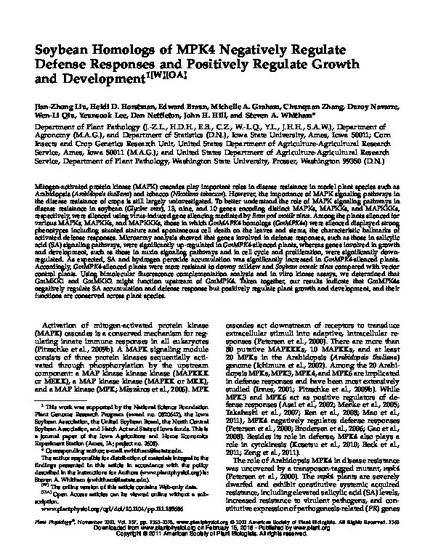
Mitogen-activated protein kinase (MAPK) cascades play important roles in disease resistance in model plant species such as Arabidopsis (Arabidopsis thaliana) and tobacco (Nicotiana tabacum). However, the importance of MAPK signaling pathways in the disease resistance of crops is still largely uninvestigated. To better understand the role of MAPK signaling pathways in disease resistance in soybean (Glycine max), 13, nine, and 10 genes encoding distinct MAPKs, MAPKKs, and MAPKKKs, respectively, were silenced using virus-induced gene silencing mediated by Bean pod mottle virus. Among the plants silenced for various MAPKs, MAPKKs, and MAPKKKs, those in which GmMAPK4 homologs (GmMPK4s) were silenced displayed strong phenotypes including stunted stature and spontaneous cell death on the leaves and stems, the characteristic hallmarks of activated defense responses. Microarray analysis showed that genes involved in defense responses, such as those in salicylic acid (SA) signaling pathways, were significantly up-regulated in GmMPK4-silenced plants, whereas genes involved in growth and development, such as those in auxin signaling pathways and in cell cycle and proliferation, were significantly down-regulated. As expected, SA and hydrogen peroxide accumulation was significantly increased in GmMPK4-silenced plants. Accordingly, GmMPK4-silenced plants were more resistant to downy mildew and Soybean mosaic virus compared with vector control plants. Using bimolecular fluorescence complementation analysis and in vitro kinase assays, we determined that GmMKK1 and GmMKK2 might function upstream of GmMPK4. Taken together, our results indicate that GmMPK4s negatively regulate SA accumulation and defense response but positively regulate plant growth and development, and their functions are conserved across plant species.
Available at: http://works.bepress.com/dan-nettleton/33/

This article is from Plant Physiology 157 (2011): 1363, doi:10.1104/pp.111.185686. Posted with permission.